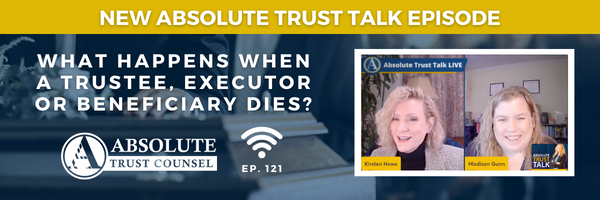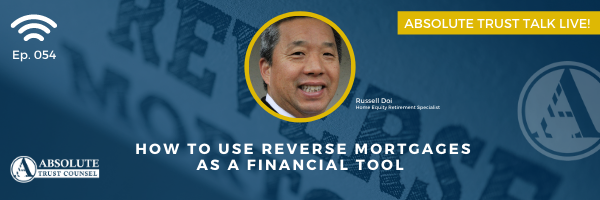If you’ve been following along with our show, you know that we can’t stress enough the importance of estate planning and setting up a trust to make things simple, cost-effective, and less time-consuming for your heirs. But even with the most comprehensive and well-thought-out estate plan, wrinkles can be thrown into the plan. It’s a lot of information for all parties involved to consume, and there are many moving parts.
One curveball we’ve seen a few times before is a beneficiary, trustee, or executor dying before the will or trust is enacted. Everyone tuning in to this podcast has probably given at least some thought as to who their assets and possessions will go to when they’re gone. But what if that person also passes? Who gets the money then? Being as transparent as possible in your estate planning documents is critical. If you haven’t revisited them in a while to answer these types of questions, take this episode popping up in front of you as your sign! And, if you don’t have a plan, there’s no time like the present to get started.
“The takeaway is to be as clear as possible in your estate planning documents. Make sure you have a few people listed as successor trustees or executors if that’s something you haven’t thought of before. I recommend having someone listed who will name a fiduciary later.”
In this episode of Absolute Trust Talk, Kirsten and Madison are diving into details, discussing what needs to be done to get a case back on track and, most importantly, what you can do now to help ensure your trust administration is a smooth process should this happen to your family or loved ones. Together, we will discuss:
- How the results and process are different depending on whether it’s a beneficiary, trustee, or executor who dies,
- Specific details that may alter how the situation is handled, such as whether the deceased beneficiary was single or married,
- How to prevent complications such as repeat probate processes,
- Why your estate plan isn’t something you just set and forget, and why it should be as detailed as possible,
- And much more.
If you have difficulty understanding the ins and outs of the estate planning world, and more specifically, trust administration, you’re not the only one. And you don’t have to go at it alone either! So sit back and listen as we cover common and uncommon scenarios regarding a beneficiary, trustee, or executor passing away. You don’t want to miss out!
Big Three from Episode #121:
- One common misconception is that people assume that if a person who was supposed to inherit dies, you go back to the instrument, and the assets go to the next person in line. But that’s not always true. If at the point the beneficiary dies and their inheritance is legally and outright theirs, then you have to look at the deceased beneficiaries’ estate plan or lack thereof for what to do next.
- Did you know that if you have a will and your executor passes away, the probate process starts again when a new executor is named? You have to file a brand-new probate petition each time because the executor must submit important documentation clarifying that they understand their job, won’t steal money, etc.
- The best way to avoid issues is to keep your trust and will up to date. You should also ensure that your wishes, trustees, beneficiaries, etc., are clearly defined. One way to do this is to name someone who will hire a fiduciary if needed. This way, you can still have some control over who gets your assets and prevent anyone from having to go to court.
Time-stamped Show Notes:
0:00 Introduction
2:04 Welcome to episode 121 of Absolute Trust Talk, where we’re jumping right into today’s topic: What happens if a trustee, executor, or beneficiary passes away?
2:43 One great example is Senator Dianne Feinstein, who passed away while in the middle of a trust administration.
3:39 To start, we will talk about what happens when a beneficiary dies as opposed to the trustee or executor. Here, we’re talking about a non-married beneficiary to keep things simple.
05:36 What happens if the inheritance is held in trust for a deceased beneficiary? It depends on what the provision says if it’s supposed to be held in trust for their lifetime, until a certain age, etc.
6:30 Many people assume that if a beneficiary dies, it goes to the next person listed, but that’s not true if the money was outright and legally theirs. Even though the beneficiary is dead, their estate plan or lack thereof would determine what happens next.
7:02 Worried about in-laws ending up with your trust fund inheritance? Kirsten and Madison recommend just holding it in trust.
8:11 Press Play now to hear some real-life examples of people who died in the middle of the process of transferring assets. You can have multiple probates that you need to work through!
10:02 We’re revisiting the Feinstein example again to look at how the wishes specified in the trust still had to be executed even though she passed away.
11:46 Now, we’re diving into what happens if a trustee or executor dies in the middle of an administration. Listen closely because things are about to get complicated!
12:11 The first step here is always to read the document – trust or will to see if an alternate is named. Pro tip: Good planning should require you to name at least one replacement!
12:43 If the trust doesn’t name an alternate, there will probably be a procedure for naming another trustee. And if it doesn’t say anything at all, then you will have to petition the court.
13:39 If the instrument is a will instead of a trust, you will go through the probate process. The problem is that you must start the process every time a new executor is named.
14:45 What happens if the person dies without a will? A new probate petition will be filed, and there is a hierarchy of who will be the executor.
15:45 Everything we’ve discussed up to this point only applies to moving the assets of a deceased person to a living person. We’re not talking about assets that go by themselves, like an IRA.
16:22 A quick note on retirement accounts: most of the time, they go through probate; there’s no alternative. So, if you’re inheriting an IRA, jump on that paperwork!
19:24 If there’s one key takeaway from this podcast: Make your estate planning documents as straightforward as possible to avoid issues after you’re gone. Pro tip: have someone who will name a fiduciary later!
20:11 Q&A: What if the deceased beneficiary was the only trustee named in the document and the sole beneficiary?
21:06 Q&A: Is there any planning that can be done to avoid probate if a beneficiary dies before receiving their inheritance?
Resources/Links Mentioned in this Episode:
- Episode 117: Estate Planning Lessons: Senator Dianne Feinstein
- Episode 101: What Does My Family Need to Know About My Estate Plan Before it’s too Late?
- Episode 098: What Are the Top Ten (Plus) Estate Planning Myths?
- Episode 097: Estate Planning Lessons from the Rich and Famous
- Episode 090: Choosing a Trustee – How to Get It Right
- Absolute Trust Counsel would love to offer access to our Incapacity Planning resource page: https://absolutetrustcounsel.com/incapacity-planning/. We’ve collected our top planning information all in one place so listeners can find videos, guidebooks, blog posts, and a host of information with tips and strategies on implementing, planning, and protecting themselves and their loved ones.
- We’re pleased to provide you with a library of e-books to address common estate planning questions and concerns in practical, easy-to-understand language. https://AbsoluteTrustCounsel.com/Resources/.
- ASK KIRSTEN: If you’d like Kirsten to answer your question on the air, please email her at Info@AbsoluteTrustCounsel.com.
[Ad] The job of a trustee isn’t as easy as one may think. You must give legal notices, retitle assets, file tax returns, understand a legal document, and perform a variety of tasks most people find unfamiliar. As a trustee, if you forget a step or make a mistake, you could be held liable.
Protect yourself, have a plan, and find out the next steps about your specific trust. Get started now by scheduling a 20-minute discovery call with Absolute Trust Counsel. During this introductory call, we will gather information about your trust administration, review our trust administration process with you, and answer any questions you may have. Our goal is to help you get the job done right!


